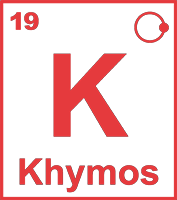
Bernard Lahousse, project manager of The Flemish Primitives.
I’ve written a couple of posts about The Flemish Primitives 2010 event (and there are more to come), but I also wanted to do an interview with Bernard Lahousse, the project manager of the event. Bernard first contacted me back in 2006 and we met at the EuroFoodChem conference in Paris in 2007. Those who’ve followed Khymos for a while may remember pointers to the “Food for design” blog and the foodpairing website which Bernard has set up.
ML: It seems you have always had an interest for things in the cross section of science and art? When we first came in contact you were writing the “Food for design” blog which covered gastronomy, science and design – what happend to it?
BL: Indeed, I’ve always been interested in the cross-section between different disciplines. Not only science-art or science-gastronomy, but many more. My belief is that the interesting stuff is happening where people with different background meet. As I lack time (and also Lieven), we made a choice to put Food for design on hold and concentrate on other topics. For me that’s foodpairing and my company. For Lieven it is his PhD.
ML: Could you briefly describe your educational background and how you ended up as a project manager for The Flemish Primitives?
BL: I have a master in bio-engineering, and a master in intellectual law. But I’ve always been interested in gastronomy. As I’m one of the founders of the Foundation (Flanders Taste Foundation) organizing The Flemish Primitives and really the intermediate between industry, chefs and universities it was quite logical to become the project leader; but it is still a hobby (none of us is gaining some money with organizing this – it is really out of love for gastronomy). But all of the innovations presented at TFP come from myself, from HPP to Dominique his foams, they were all initiated by me (so quite logical I’m the project manager)
ML: I find it difficult to put TFP in a specific category – it is part gastronomy, part science. How would you in as few words as possible define The Flemish Primitives? And the company “Sense for taste” where you work, could you briefly explain the business concept?
BL: The Flemish Primitives aspires to become the most innovative and creative culinary event in the world. The way we do it is by combining different players: chefs, scientists, companies, artists,… So The Flemish Primitives wants to give you a glimpse of what is possible in the future in gastronomy and food. It is meant to inspire and let people start dreaming.
In “Sense for taste” we position ourselves as a foodlab increasing the efficiency in food product development. Foodpairing is one of the methods we use. So we do consultancy, but we also develop our own products. We work mainly for the big food multinationals, but also for farmers with a passion for products…We are with 3 partners; an ex-Michelin star chef Peter Coucquyt, a product developer Johan Langenbick and a scientist myself.
ML: Could you give one example of how science, gastronomy and art have been combined into something which is more than just the sum of three parts?
BL: The plates from Sergio Herman e.g.
ML: Very often cooking comes first and is later explained by science, possibly with a few adjustments. Do you have any examples were it started with science (or technology) sparked the creativity of a chef?
BL: The system of using pectin methylesterase naturally present to make gels out of tomato, was initiated by science and executed by chefs afterwards.
ML: What are the biggest challenges you have faced when working with TFP?
BL: We don’t lack ideas/content. But to organize an event like this you should need at least 1 or more persons working the whole year on this event to prepare and we lack for the moment the means to make this a professional organisation (it is still like a bunch of friends). We are still a private organization without any support from the Government, but hoping that will change in the future.
ML: Your debut was last year, this year amazingly all seats were sold out (BTW – how many tickets were sold?) – what are your plans and expectations for next year and the years to come? Will you remain in Belgium or “go global”? What would be a “dream come true” for TFP?
BL: We sold around 400 tickets, the rest was taken by food companies. My dreams are to build a platform with Belgian chefs, universities, companies,… The outcome of this cooperation will be shown each year at The Flemish. There are some plans and requests to go global, but these are still plans for the moment.
ML: A final question – when working all day long with food and The Flemish Primitives, how has your work influenced your own cooking at home? And what is your favorite dish?
BL: The way of using meat and fish changed at lot (now mostly low temperature). For the rest my cooking changed a lot as my using now different products inspired by what chefs are using. My favorite dish; that’s a hard question. It will probably contain fish and then some vegetables also low temperature treated.
ML: Thank you very much!
(The interview was done by email since Bernard had a pretty hectic time schedule on the day of the event.)
–
I also visited The Flemish Primitives in 2009. You can read more about that in my four posts from last year: The Flemish Primitives: A travel report (part 1), Chocolate surprise (part 2), Heston Blumenthal (part 3) and Glowing lollipops (part 4). Final note to readers: This year my travel expenses were covered by TFP and the tourism bureau of Brugge.
